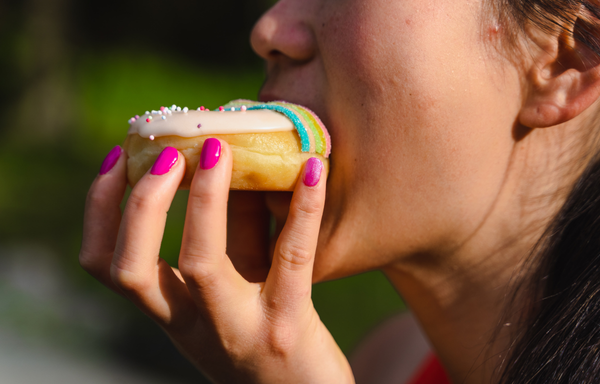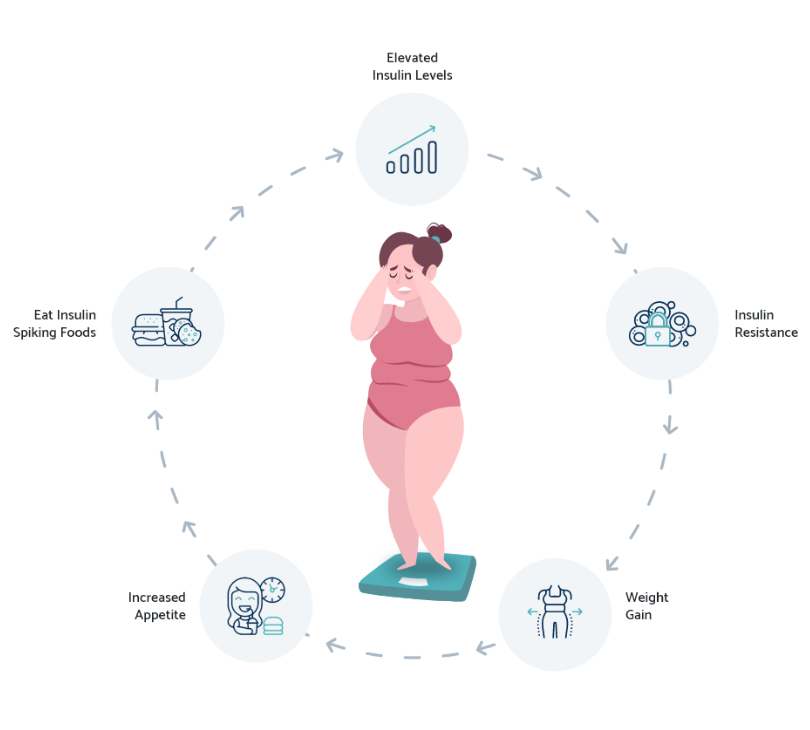

Why High Insulin Levels Make You Crave Carbs and Sugar and How To Fix It
If you feel like you’re constantly craving carbs and sugar, it’s not just a matter of willpower—it’s your hormones. Cravings aren’t random; they are a direct response to high insulin levels and how they affect your brain, blood sugar, and appetite hormones.
When insulin is elevated, your body gets stuck in a cycle of hunger, energy crashes, and intense cravings for quick sugar fixes. The more often this cycle happens, the stronger those cravings become. This is why people who struggle with insulin resistance often feel completely controlled by their cravings.
But understanding why this happens can help you finally break the cycle.

How Insulin Triggers Carb Cravings
1. Your Body Can’t Access Energy, So It Craves Sugar
Your body is designed to get energy from two main sources:
- Glucose (from starch, sugar, and even protein in rare cases)
- Stored body fat or the fat you eat
But when insulin is too high and isn’t working properly—as in insulin resistance—your body struggles to access both.
- Glucose can’t get into your cells efficiently because insulin isn’t doing its job properly. This means that even though there’s plenty of glucose in your bloodstream, your cells are essentially “starving” for energy.
- At the same time, high insulin blocks fat-burning. So not only can’t your body access glucose properly, but it also can’t use fat for fuel.
With both major energy sources unavailable, your brain sends intense cravings for quick energy—sugar and starch. It’s not just a habit—it’s a biological survival response.
This is why insulin-resistant people constantly feel hungry and fatigued, even when they have eaten or have plenty of stored fat available. Their body just can’t access it.
2. Insulin Clears Sugar Too Quickly—Then Leaves You Crashing
Sometimes when you eat foods that spike insulin—like bread, pasta, rice, sugary snacks, or even “healthy” options like oatmeal or granola—your body rapidly absorbs the sugar into your bloodstream.
In response, your pancreas releases insulin to clear that sugar out and store it in your muscles, liver, or fat cells. But here’s the problem:
- If too much insulin is released (which happens when insulin resistance is present), it sometimes clears sugar out too aggressively.
- Blood sugar drops too low, leaving you feeling shaky, tired, irritable, and craving more sugar or carbs to “fix” it.
This is the blood sugar rollercoaster—a constant cycle of spikes and crashes that keeps you craving quick, high-carb foods all day long.
3. Insulin Disrupts Your Appetite Hormones
High insulin doesn’t just affect blood sugar—it also throws off the hormones that control hunger and cravings.
- Ghrelin (your hunger hormone) stays high, making you feel hungrier than you should.
- Leptin (your fullness hormone) gets blocked, so your brain never fully registers that you’re satisfied.
- GLP-1 (a hormone that naturally suppresses appetite) gets blunted, making it harder to feel full.
This is why people with high insulin often feel hungry even after eating. Their hormones are pushing them to keep eating, even when their body has had enough.
4. Insulin Hijacks Your Dopamine System
Dopamine is the brain’s reward chemical, and high-carb, sugary foods trigger massive dopamine surges. This is why junk food feels addictive—your brain starts associating these foods with quick pleasure and energy.
But when insulin is constantly high, your brain becomes desensitized to dopamine. This means:
- You need more and more sugar and carbs to get the same level of satisfaction.
- You start craving carbs even when you’re not physically hungry.
- The cycle repeats, reinforcing compulsive eating and making it harder to stop.
This is the same mechanism seen in drug addiction, which is why sugar cravings can feel so overpowering.
Breaking the Cycle: How to Stop Carb Cravings for Good
The only way to truly stop cravings is to lower insulin and stabilize blood sugar. When insulin drops to normal levels, your appetite hormones reset, your energy stabilizes, and your cravings disappear.
1. Eat to Keep Insulin Low
- Focus on protein, healthy fats, and fiber from non-starchy vegetables at every meal.
- Avoid high-insulin foods like sugar, starch, and dairy.
2. Don’t Eat Small, Frequent Meals
- Every time you eat, insulin is released. Constant snacking keeps insulin elevated all day long.
- Instead, eat larger, more satisfying meals that keep you full for hours.
3. Prioritize Sleep and Stress Management
- Lack of sleep raises cortisol, which raises insulin—leading to stronger cravings.
- High stress also increases sugar cravings, so daily stress management (like walking, deep breathing, or yoga) helps stabilize appetite hormones.
The Bottom Line
If you feel addicted to carbs and sugar, it’s not your fault—it’s insulin driving the cravings. High insulin creates a vicious cycle of energy crashes, hunger, and dopamine-driven urges for quick carbs.






















